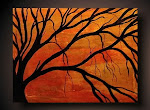Helgö and the Scandinavian Traders
Publicada por
Arith Härger
/ 3:43 PM /
The human being has always been a great traveler, going from one country to another, exchanging goods, beliefs, ideas, friendship, other economical connections and so on. Today in the modern world, this is too easy and it seems to us that these kind of interactions wouldn't be possible in ancient times, or at least, it might have been so difficult to travel from one country to another and it took too long, that people simply stayed in their own land, but amazingly this wasn't the case in ancient times, and i will give you some exemples, starting with a small Island called Helgö, situated in Lake Mälaren near Stockholm in Sweden, a place that has seen much movement in ancient times as we seen in any other modern capital city.
Around the year 200 AD the first town was build in Helgö . Today it seems a very remote place but the lake was once a fjord, boats could easily sail, go to and fro, from Helgö out into the Baltic Sea. From there, routes led to the east of Russia, west of Britain and Ireland, and, by following the rivers through the hinterland, far south to Constantinople and even into the Mediterranean Sea, making trading posts from Portugal and Spain, all the way to the southeast to Italy and Greece. Helgö was at the centre of a vast trading network, not just to the scandinavians, but also boats from other countries came to this place.
Those familiar with the norse history and the lovers of Vikings know well that Scandinavian traders travelled widely, not just in terms of war and to pillage. Some of the places they have travelled to are remarkable for that period. They have travelled to places such as Dublin in Ireland where they founded a Scandinavian trading port. Recently i have read a book called the Eaters of the Dead which is the account of the Arab diplomat Ahmad ibn Fadlān and he recorded the Scandinavian Rus trading on the Volga River, the book might be a fictional book, but it was based on the real accounts of this Arab diplomat, there are lots of text excerpts and i went to investigate the real story of this account, and the book is only fictional when talking about the Norse group that went with Fadlān into the North of Europe, because in truth he was really there, and this is one exelent proof how far the Norse people went, and speaking about the Rus Norse tribe, they were so importante and made so much trading routes often to the could east parts of Europe, that the country was named after them ( Russia ). Farther south, the Scandinavians formed the elite Varangian guard, protecting the Byzantine emperor himself, one of these guards, called Halfdan, even carved his name in runes in the main church, the Hagia Sofia.
Wherever country Scandinavians went, they traded with the inhabitants of the regions and also those inhabitants came to the Scandinavian lands, this is actually accounted by the unusual collection of objects discovered at Helgö. Digging at a farm, archaeologists found the top of a bishop’s crozier originating from Ireland, a christening cup originating from Egypt, and, most curious of all, a bronze statue of the Buddha originating from the area around Afghanistan. The items date to the 6th century AD, it is remarkable to see such objects there, from diferente religions, diferente beliefs of those of the inhabitants of Helgö.
It is possible that traders reached places as remote as Afghanistan, why not? Centuries earlier the Celts did the same and went as far as Mongolia and the Gobi Desert north of China. Imagine the amount of knowledge these people had, interacting with so many diferente cultures and religions, how would early Scandinavians face this fact, when their gods were so much diferente than others' gods? Probably they all lived well with that fact, for the trading with other countries would continue for many centuries, people in those times weren't as fanatical about religion as most countries are today.
Note: If you have any questions for me or if you want to see my artistic works, check out my Facebook page and make a Like if you can by following this link --> http://www.facebook.com/ArithHarger
em 3:43 PM | Keywords: Ahmad ibn Fadlān, Archaeology, European History, Hagia Sofia, Helgö, Lake Mälaren, Medieval, Norse, Scandinavian Traders, Sweden





0 comentários:
Post a Comment